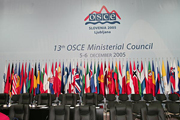Slovenia's OSCE Chairmanship in 2005
Slovenia began its OSCE chairmanship with the Triple R slogan ("Revitalize, Rebalance, Reform"). When the country assumed chairmanship at the beginning of the year, the organisation had no budget, no accepted scale of contributions, nor an agreement on the next Secretary-General. The firm basis for reforming the organisation and increasing its efficiency was secured by forming a group of prominent people and acquiring their ensuing report. At the close of Slovenia's chairmanship, one could conclude that the set goals had been achieved, the atmosphere of cooperation had improved substantially, the organisation had been revived, adopted a budget, accepted a scale of contributions, agreed upon a new Secretary-General, and passed a plan for gradual reform and strengthening.
The Chairman-in-Office responded quickly to challenges which arose during the year (Ukraine, Kyrgyzstan, Uzbekistan), and with his untiring personal interventions and visits to the countries involved, prevented many crises. We paid special attention to the situation in regions where peace is not secured, and with numerous activities and initiatives, tirelessly dealt with inherited frozen conflicts (Kosovo, Nagorno-Karabakh, Georgia - South Ossetia, Pridniester). With some, progress was made in the negotiations on possible solutions, which is also evident in the documents adopted.

Within the OSCE's three dimensions, 22 decisions have been adopted, a fair and balanced number, thus overcoming the fierce criticism of the OSCE's functional imbalance on the part of CIS member states in 2004. With the 13th OSCE Economic Forum, which focused on demographic trends, migration, and integrating persons belonging to national minorities, Slovenia, chairing the OSCE with its predominant priority of "migrations-integration", succeeded in innovative efforts to connect the three dimensions.
With regard to the human dimension, the greatest achievement of the OSCE Ministerial Council is the consensus on the decision to improve the effectiveness of the OSCE. The consensus is in line with discussions about OSCE's reform which started this year, and assigns the participating countries their tasks regarding the reforms to be carried out in the coming years. The decision preserves the independent status of the ODIHR in election observation, and sets out tasks for the 2006 elections. A breakthrough was achieved in the decision on tolerance and discrimination, and establishing mutual respect and understanding, which also dealt with the alliance of civilisations and the roles of civil society and non-governmental organisations. According to many delegations, this is one of the most important decisions, providing for conferences in this field every two years. The experimental project on human rights education initiated by Slovenia was widely accepted, as was shown by the support of the countries in achieving consensus on this decision at ministerial level.
The key emphasis of OSCE's activities in political and military spheres was the implementation of the Strategy to Address Threats to Security and Stability in the 21st Century. A number of decisions adopted by the Ministerial Council point, on the one hand, to the diversity of this area and the structural complexity of security challenges and, on the other hand, to the important progress in the cooperation of this organisation with other international organisations in tackling these challenges.
Slovenia was active in many areas, providing experts, donations and coordination of certain activities, such as, for example, the implementation of the Document on Stockpiles of Conventional Ammunition. Slovenia contributed substantially in reaching consensus on the organisation of a military doctrine seminar. Her activities in political and military spheres prove that the country is capable of contributing to the management of these processes with know-how, experience and resources. Representatives of a number of other ministries were also actively involved in activities in this area, e.g. the defence, interior, finance, and justice ministries.
Slovenia's OSCE chairmanship was very successful. Not only did we fulfil completely our chairmanship plan, we also achieved the main goal set years ago when we accepted this task. This is all due to the enterprise and tireless activity of the Chairman-in-Office, Minister Dr Dimitrij Rupel, the expert assistance of the Permanent Representation of the Republic of Slovenia to the OSCE in Vienna, and the OSCE project group at the Ministry of Foreign Affairs. Working enthusiasm and a good atmosphere in both groups were the key factors of success, as were the activities of Slovenian diplomatic and consular missions abroad. With its OSCE chairmanship and the organisation of the Ministerial Council in Ljubljana, Slovenia has proved to be a reliable partner in the international arena, with the will and know-how to contribute with its initiatives and actions to the strengthening of stability in the world, and promote international cooperation.
The Ministerial Council was, according to all participants without exception, commendably organised, which confirms Slovenia's organisational capabilities and also shows the cultural development the country has achieved. Judging by a great number of informal foreign assessments at the Ministerial Council in Ljubljana, Slovenia's chairmanship was remarkably successful in terms of content and organisation, and also one of the best in the last decade.
Source: Ministry of Foreign Affairs

